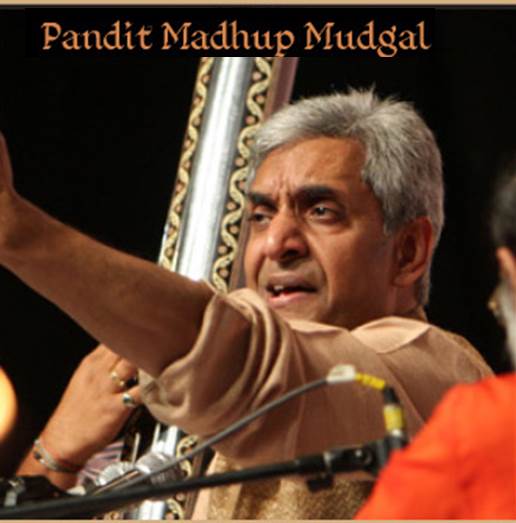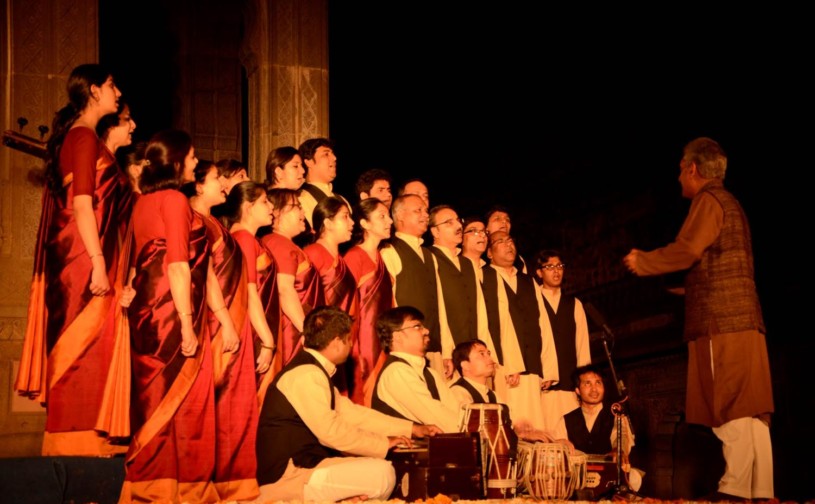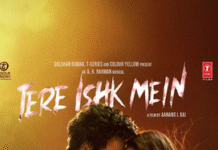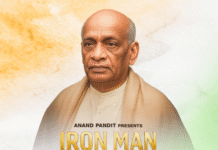By Shekhar Shastri
Special to INDIA New England News
WESTON, MA—(Editor’s note: On June 24, music maestro Pandit Madhup Mudgal, principal of Gandharva Mahavidyalaya in New Delhi, and his team will bring rare and new musical forms to Boston. On this occasion, Boston musician and writer Shekhar Shastri spoke with Pandit Mudgal on behalf of INDIA New England News. See below conversations between Shashtri and Pt. Mudgal, who received his Hindustani music training from Pt. Vasant Thakar, Pandit Jasraj and Pt. Kumar Gandharva. Among many awards and recognition, Pt. Mudgal is a recipient of Padma Shri, one of the Indian government’s highest honors. He is known for his innovative musical compositions and conducts the ‘Gandharva Choir’, which will perform on June 24 at Regis College in Weston, MA)

Question: What is special about Gandharva Choir in the world of classical music?
Pt. Mudgal: Gandharva Choir is a different kind of musical expression. The sound of our choir is different from the normally heard solo Indian Classical music. Choir music generates a new kind of joy both for the performing musicians as well as the audience.
Solo performance does not require any melodic coordination by definition. In the choir, the complexity goes up tremendously, creating room for newer innovation and unusual compositions. It is this newness that appeals to our wider audiences along with the diverse rich set of our music which is classical, folk, popular, and inspirational – all of it together creates a fresh and thrilling experience.
Question: Who is your audience?
Pt. Mudgal: We have performed all over the world, and in our music there are no barriers of language or culture. We have performed in the US at Lincoln Center in New York, at Kennedy Center in DC, and in Europe we have been received very warmly in Europe, and in Asia.
Within India, both the connoisseurs as well as the new, younger folks flock to our concerts. Many people, who do not have the patience to sit through a long solo classical recital, love our music.
Question: How has the response to your choir changed over the years?
Pt. Mudgal: Our choir has been in existence for several decades, and it traveled the world early on with great reviews in New York Times and Washington Post. In fact, the response in the West was greater than in India – perhaps due to the long choir singing tradition in the West. Today we have a busy performance schedule across India and all over the world.
In India, Pune is a conservative bastion of classical music and 30 years back we performed there to a motley audience of 30 which included Pt. Bhimsen Joshi and Pt. Vasant Rao Deshpande; last year we had a non-stop 3-hour concert there with a huge audience of hundreds of people that kept asking us for encores.
Question: So what has changed – your music or the audience?
Pt. Mudgal: Earlier, the purists in India did not know how to classify us; however, over the last decade it has changed a great deal, with our choir receiving invitations to perform at prestigious music festivals. The size of our audiences continues to grow. For a classical musician like me, it is overwhelming to see that our music is reaching such popular levels
Question: What is the connection of your music with dance?
Pt. Mudgal: I have been composing music for classical dancers for a long time. Over time, people noticed our choir compositions, and today thousands of dancers use our music for their dance recitals. I receive countless requests for newer compositions from dancers all over the world.
Question: What kind of classical compositions do you sing?
Pt. Mudgal: In Indian Classical Music, solo performance is the norm and designed to take you into endless creative journey, since there is little coordination required. However, choral singing is all about coordination, therefore, regular Khyal compositions are not suitable to be sung in a choir. Thus, other forms are used by us such as Dhrupad, Dhamar, Trivat, Tarana, Chaturang; except for Tarana, other forms are sung infrequently by soloists. The Gandharva Choir is helping bring these other delightful musical forms back in vogue.

Question: Are there musical forms that are ideally suited for the choir?
Pt. Mudgal: A complex composition like Chaturang flowers when sung as a group. When multi-part harmony is added to it, a magic occurs which is not possible for a single singer to create. Similarly, Thillana and Tarana can be unleashed creatively with immense energy in a group.
Question: Apart from Hindustani Classical, what else is in the repertoire of the choir?
Pt. Mudgal: We sing Carnatic compositions such as kritis and thillanas as well; some of these have been taught to us by stalwarts such as Pt. Mallikarjun Mansur, Vidvan Sri Rajaram, and Vidvan MD Srinivasan.
We have a large repertoire of folk and popular songs from all across India, whether from Bengal, Rajasthan, Punjab, Gujarat, Goa, Karnataka, and so on. Our bhajans in Braj, Awadhi, and Bhojpuri are very popular. Then, we have experimental pieces that cut across many genres and geographies.
 Question: Is there any Western influence in your music?
Question: Is there any Western influence in your music?
Pt. Mudgal: We do use Western choral techniques such as harmony and canon singing. And yes, we have a few compositions that are our own exploration of Western musical themes using Indian classical approach. You will have to listen to those to know more.
Question: Are these inspired from Western Classical, pop or Hollywood?
Pt. Mudgal: A little bit of each of these and more. As an example, I was in high school when I saw a Hollywood movie, ‘Queimada’ starring Marlon Brando; its music never left me and many years later it influenced one of my compositions which has been used by classical Indian dancers. If there is interest, we can perform it in Boston.
Question: Any other interesting connections from the world of popular music?
Pt. Mudgal: In the 70s, the Hindi film, ‘Bobby’ had just been released and I was playing the song on guitar, much to the chagrin of my ‘classical’ parents. At that time, the famous classical maestro from Goa, Pt. Jitendra Abhisheki was visiting us; he saw my enthusiasm and taught the choir Goan folk songs that had inspired the Bobby song. Now it is a part of our choir repertoire which audiences love without fail.
Question: I find listening to choir much easier. Why is it so?
Pt. Mudgal: Listening to solo singing requires focused attention while listening to a duet takes less energy; correspondingly group music is easier to listen to. To keep the listener engaged, instrumental music is generally added. However, as choir musicians, our instrument is voice – so we increase the richness of the voice music and its complexity, which fills up the sensory field of the audience.
Question: Is this what makes it more thrilling for the listener?
Pt. Mudgal: Since there are more singers, more new possible directions that a song can take; there can be surprises that continue to amuse the listener. The unfolding drama of anticipation and the musical conversation within the choir keeps the audience hooked.
Question: Are there any social reasons for the enjoyment from choral experience?
Pt. Mudgal: Perhaps the choral context enhances the human social connection; the listener to our choir starts harmonizing with the music and then gets instantly connected to a deep joyous musical family on the stage. Then the listener revels as an integral part of the happily singing family.
Question: Any likelihood of recruiting some local talent from Boston to be part of your choir?
Pt. Mudgal: Music students and music lovers should come and experience the joy of singing as a group. If there is talent, interest and a willingness to work hard, we are certainly open to training enthusiastic students.
Question: We are looking forward to your visit to the Boston area with your Gandharva Choir on June 24.
Pt. Mudgal: Boston will be our first stop in our concert tour of the US this time, and we are very excited to meet the music-loving people of Boston.
Learnquest Academy of Music and Meru Education Foundation are hosting the Gandharva Choir in the Boston area with a concert on Saturday, June 24 at 6pm at Regis College (235 Wellesley Street, Weston, MA 02493).
To Reserve Seats or for more information:
Buy Tickets at Square or Lokvani: General $10 and Patron $100
Email: raagarangboston@gmail.com
Website: www.imeru.net
Phone: +1 (508) 68-RAAGA












